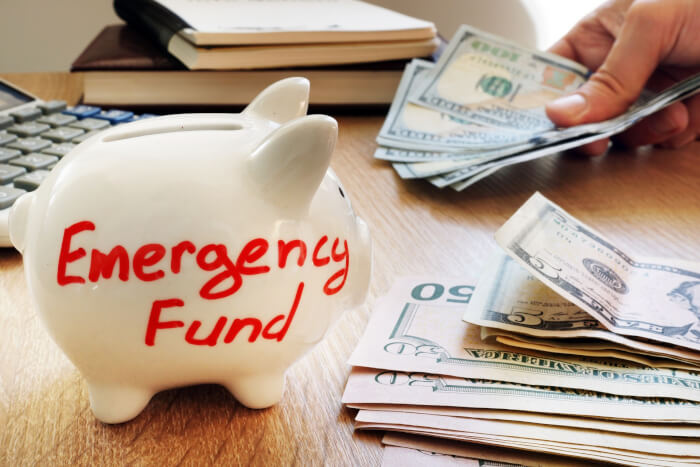Experts Reveal 4 Steps To Rebalance Your Finances Disrupted By COVID-19
The past 19 months have not been easy as the COVID-19 pandemic has disrupted the lives and financially drained tens of millions of people.
The number of people losing their jobs has reached a record level due to the COVID-19 pandemic. They have to subsist on food banks, mortgage loans and month-to-month unemployment benefits. Currently, a number of people have found work after a period of unemployment and the job market is vibrant again or at least less stressful than it was a year ago. Even so, there are still millions of people without work and in need of support while the pandemic rages.
However, if you're in a place that's no longer impacted too much by the pandemic and are trying to get your finances back on track, here are four steps you need to take now.
Cutting retirement preparations for a few months won't be the end of the world; but if you're financially stable, the following would be a smart move to reverse that. Experts recommend saving at least 15% of your income each month into a 401(k) or individual retirement account (including an employer-matching account if you are qualified), and it helps to increase your contribution by even a few dollars per month.
And if you're 50 or older, take advantage of the catch-up contribution. This type of retirement savings contribution will add $1,000 in IRA and another $6,500 in a 401(k) this year. Married couples in which one partner is not working can also take advantage of an IRA, which allows the working partner to contribute the maximum amount for both spouses.
Also, higher education expert Mark Kantrowitz advised to check if your student loan company, which bills you monthly, has up-to-date contact information or not, such as any notice of a change in home address or banking information.
If, by February, you're still on a tight budget and unable to pay, you'll have a few options: You can claim benefits due to economic hardship or unemployment, in that way you won't accrue interest. If you don't qualify for the benefit claim, you may be able to put your debt on hold. This will pause your monthly payments, but the interest will still increase.
Finally, you can also refer to an income-based repayment plan. This plan can reduce your monthly payment by letting the debt pay off a portion of your income.
Plan to talk to your spouse, children, and other close family members about your finances. Make sure you have a will and power of attorney, regardless of whether you are young and healthy or have had children or not.
An easy first step in the estate planning process is to make sure that all of your financial accounts including your 401(k), IRAs, savings accounts, life insurance policies, and other savings accounts have been designated beneficiaries. This can usually be done in minutes on most financial companies' websites.
If there's one lesson many people have learned from the pandemic, it's going to be the importance of having an emergency fund, no matter how safe you think your job is.
Most experts will recommend saving for a minimum of three to six months for essential expenses like housing, food, transportation, and debt in a liquid savings account. account. However, it depends on your situation that you can put away more to really feel secure. Many people wonder what if they don't have enough money to keep such an amount. Then it's time to make some sacrifices. You can consider items that are not really urgent.
One small savings tip is to make a list of all the unnecessary expenses you spend every month, including recurring subscriptions and membership cards. Rank them in order of importance and then cut costs off at the bottom of the chart for weeks or months. This won't make you rich right away, but it's a relatively easy way to help you accumulate a bit more. If you feel like you don't have anything left over to put away, find ways to increase your income.
H/T: CNBC
The number of people losing their jobs has reached a record level due to the COVID-19 pandemic. They have to subsist on food banks, mortgage loans and month-to-month unemployment benefits. Currently, a number of people have found work after a period of unemployment and the job market is vibrant again or at least less stressful than it was a year ago. Even so, there are still millions of people without work and in need of support while the pandemic rages.
However, if you're in a place that's no longer impacted too much by the pandemic and are trying to get your finances back on track, here are four steps you need to take now.
Raise your retirement savings
 Source: The Motley Fool
Source: The Motley Fool
Cutting retirement preparations for a few months won't be the end of the world; but if you're financially stable, the following would be a smart move to reverse that. Experts recommend saving at least 15% of your income each month into a 401(k) or individual retirement account (including an employer-matching account if you are qualified), and it helps to increase your contribution by even a few dollars per month.
And if you're 50 or older, take advantage of the catch-up contribution. This type of retirement savings contribution will add $1,000 in IRA and another $6,500 in a 401(k) this year. Married couples in which one partner is not working can also take advantage of an IRA, which allows the working partner to contribute the maximum amount for both spouses.
Make a plan to repay your student loan debt
 Source: Flyer Talk
Source: Flyer Talk
Also, higher education expert Mark Kantrowitz advised to check if your student loan company, which bills you monthly, has up-to-date contact information or not, such as any notice of a change in home address or banking information.
If, by February, you're still on a tight budget and unable to pay, you'll have a few options: You can claim benefits due to economic hardship or unemployment, in that way you won't accrue interest. If you don't qualify for the benefit claim, you may be able to put your debt on hold. This will pause your monthly payments, but the interest will still increase.
Finally, you can also refer to an income-based repayment plan. This plan can reduce your monthly payment by letting the debt pay off a portion of your income.
Always prepare for the worst-case scenario
 Source: Love To Know
Source: Love To Know
Plan to talk to your spouse, children, and other close family members about your finances. Make sure you have a will and power of attorney, regardless of whether you are young and healthy or have had children or not.
An easy first step in the estate planning process is to make sure that all of your financial accounts including your 401(k), IRAs, savings accounts, life insurance policies, and other savings accounts have been designated beneficiaries. This can usually be done in minutes on most financial companies' websites.
Prioritize building an emergency fund
 Source: North Shore Bank
Source: North Shore Bank
If there's one lesson many people have learned from the pandemic, it's going to be the importance of having an emergency fund, no matter how safe you think your job is.
Most experts will recommend saving for a minimum of three to six months for essential expenses like housing, food, transportation, and debt in a liquid savings account. account. However, it depends on your situation that you can put away more to really feel secure. Many people wonder what if they don't have enough money to keep such an amount. Then it's time to make some sacrifices. You can consider items that are not really urgent.
One small savings tip is to make a list of all the unnecessary expenses you spend every month, including recurring subscriptions and membership cards. Rank them in order of importance and then cut costs off at the bottom of the chart for weeks or months. This won't make you rich right away, but it's a relatively easy way to help you accumulate a bit more. If you feel like you don't have anything left over to put away, find ways to increase your income.
H/T: CNBC
Share this article
Advertisement